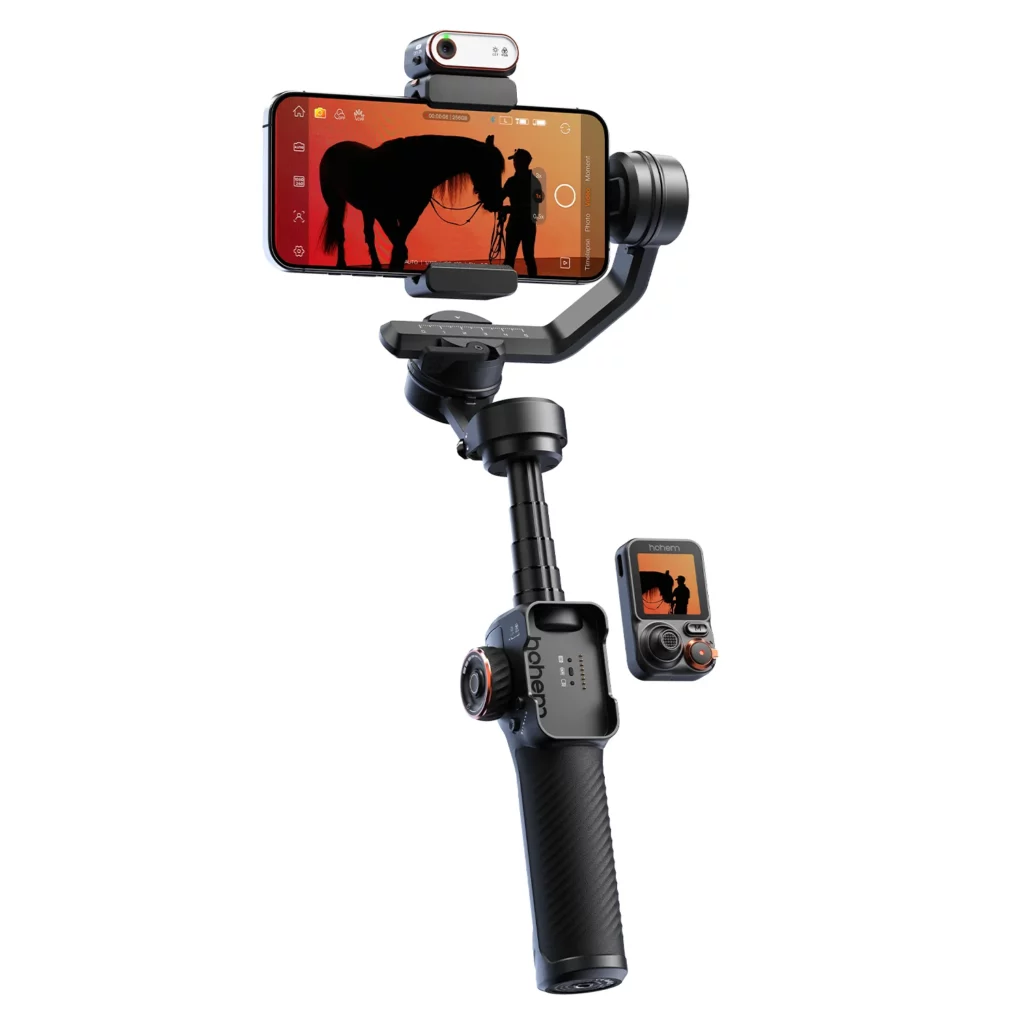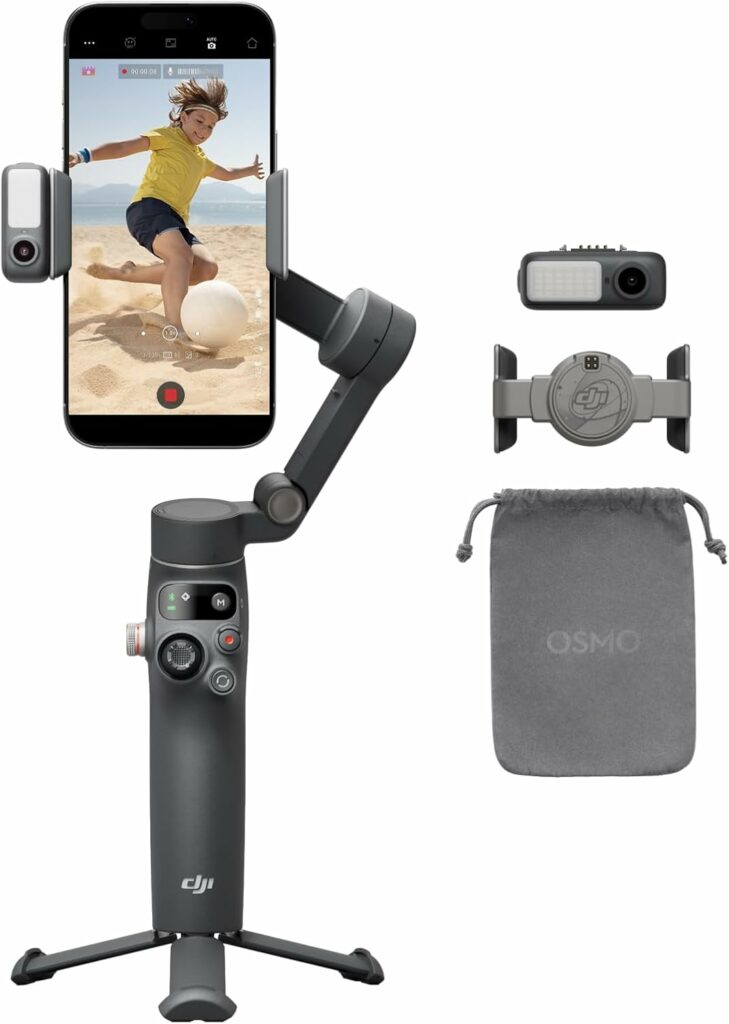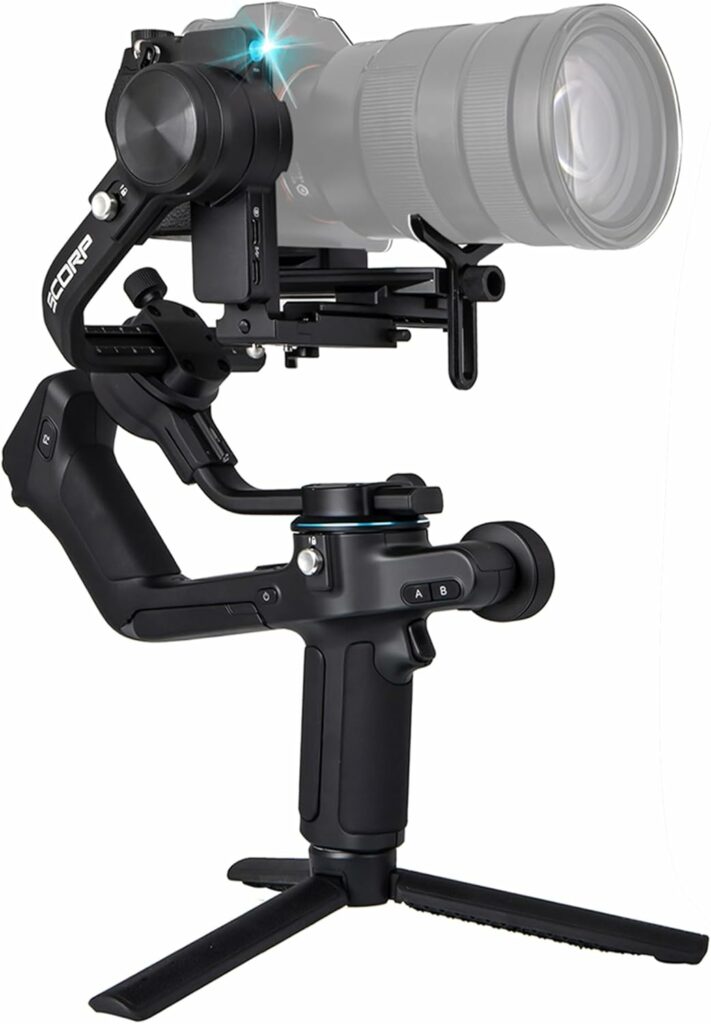Smartphones keep growing—literally. The iPhone 16 Pro Max tips the scale at 240 g before you add a magnetic power bank or anamorphic lens. Consequently, many lightweight gimbals wobble under the strain. After loading giant phones, filters and batteries onto every model I could find, these four best gimbals for heavy smartphones 2025 kept footage smooth without motor whining.
1. Hohem iSteady M7 — King of Payload Headroom

First up, the iSteady M7 impressed me with its payload rating of 500 g. That’s enough for an iPhone 16 Pro Max, Moment anamorphic, ND filter and MagSafe battery—no counterweights needed. Moreover, Hohem’s detachable AI sensor means hands-free tracking in any app.
- Battery: 10 h (USB-C PD quick-charge)
- Pros: Beefy motors, modular remote screen
- Cons: 560 g gimbal weight feels heavy after long takes
Read my Hohem iSteady M7 Review
Check out the Hohem iSteady M7 on Amazon
2. DJI Osmo Mobile 7 Pro — Best All-Rounder for Big Phones

Although DJI rates the OM 7 Pro at 300 g, real-world tests showed the motors remain stable up to about 330 g—plenty for an iPhone 16 Plus or Galaxy S25 Ultra with slim case. Furthermore, its bi-colour LED saves carrying an extra light.
- Extension Rod: 215 mm built-in
- ActiveTrack 7.0 works in native camera apps
- Battery drains quicker at full LED brightness
Read my DJI Osmo Mobile 7 Pro review
Check out the DJI Osmo Mobile 7 Pro on Amazon
3. Insta360 Flow 2 Pro — Smartest Tracking for Foldables

Foldable phones shift weight as you open them; nevertheless, the Flow 2 Pro auto-rebalances thanks to stronger torque and DeepTrack 4.0. Additionally, Apple DockKit support means seamless FaceTime tracking on an iPhone 16 Flip.
- Payload sweet-spot: 310 g — 350 g
- Free-Tilt mode removes tilt-axis limits for creative angles
- Entering Free-Tilt requires an extra twist setup
Read my Insta360 Flow 2 Pro review
Check out the Insta360 Flow 2 Pro on Amazon
4. FeiyuTech Scorp 2 — Budget Workhorse Under $300

Need big-phone stability without a DJI price? The Scorp 2 handles 2.5 kg for mirrorless—so a 350 g phone feels like nothing. Besides, its built-in AI camera tracks subjects with no app, perfect when you film gym tutorials.
- Battery: 9 h with fast USB-C refuel
- Dual-grip design reduces arm fatigue
- No built-in selfie rod; bring a mini-tripod for overheads
Read my FeiyuTech Scorp 2 review
Check out the FeiyuTech Scorp 2 on Amazon
Buying Tips for Heavy-Phone Creators
- Check payload headroom: aim for at least 50 g spare beyond your phone-plus-accessories weight.
- Test motor noise: whine = overload; add counterweights or go up a tier.
- Consider grip weight: big motors mean heavier gimbals—use dual handles or sling straps on long shoots.
Final Thoughts
Ultimately, heavy phones no longer force you to accept shaky footage. Personally, I grab the Hohem iSteady M7 when I attach lenses, while the DJI OM 7 Pro covers 90 % of my daily vlogging without straining my wrist. Whichever pick you choose, the five gimbals above will tame even the bulkiest 2025 smartphones.
Frequently Asked Questions
What counts as a “heavy” smartphone in 2025?
Anything above roughly 230 g—for example, the iPhone 16 Pro Max (240 g) or Galaxy Z Fold 6 (253 g). Add-on lenses, filters or MagSafe batteries push real payloads closer to 330 g.
Will these gimbals work if I attach a Moment anamorphic lens?
Yes, provided the total weight stays within each gimbal’s rated payload. Our top pick, the Hohem iSteady M7, handled a 330 g iPhone-plus-lens setup in testing.
Do I need counterweights for foldable phones?
Not with the gimbals listed—Hohem M7, Insta360 Flow 2 Pro and Scorp 2 have sufficient torque. However, lighter models like Zhiyun Smooth Q4 may require Zhiyun’s $19 counterweight kit for perfect balance.
How long does battery life last with big phones?
Heavier payloads make motors work harder, trimming runtime by 10-20 %. Expect around 7–8 h on the DJI OM 7 Pro and up to 10 h on the iSteady M7.
What’s the easiest way to check if my phone is too heavy?
Weigh your phone with all accessories on a kitchen scale, then compare to the manufacturer’s published payload limit. Aim for at least 20 g of headroom for safe performance.
Related Guides & Reviews:
